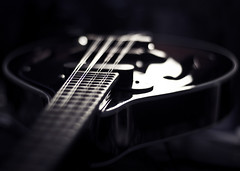Electronic dance music and Americana, two of today's most vibrant music forms, are moving in opposite directions. With its standardized tempos, booming beats and swooshing synthesized sounds, EDM owns the moment: Laptops and laser light shows in tow, its artists entertain in huge arenas and at massive festivals often with more than 100,000 fans in attendance. Name-brand pop stars are hiring them to work on their recordings. But in a grab for an even larger audience, EDM has become ever more predictable and increasingly dull. The best you can say for it now is that it's kind of new.Read the whole thing (and if the Journal's Web site wants you to subscribe, remember that Google is your friend). While such an article might appear only tangentially related to narrative, genre and the craft of writing, a particular phrase from it stood out to me: "In Americana, burnished talent rather than longevity is a measure of merit in the community." Now think about the term "burnished talent" neatly sums up the divide between genre and literary fiction. Why does the literati sniff at titles that crack The New York Times bestseller list? You can't blame it solely on reflexive snobbery. Why go genre fans yawn over self-consciously artistic reads? Don't think that they're entirely devoid of sophistication. Instead, I think the two camps simply value different aspects of good writing. Literary types love undiluted compositional skill, that polished talent. Genre fans go in for readability and entertainment.
Meanwhile, Americana ambles along with acoustic instruments and twangy electric guitars. It has little presence in today's mainstream and its greatest heroes are the roots musicians of a storied past.
The sad thing is that readers needn't face this division at all. Great prose and exciting action can hold hands, as authors such as Justin Cronin (The Twelve) and Glen Duncan (The Last Werewolf) have demonstrated. May more writers see their example and bridge the divide.
(Picture: CC 2010 by FLEECIRCUS)



2 comments:
My only contribution to this discussion is that the pulsing beat in most electronic music gives me an instant headache. I remember my parents saying this about sixties music, but they were wrong. I am right.
Patti, are you telling me you aren't a fan of Skrillex?
Post a Comment